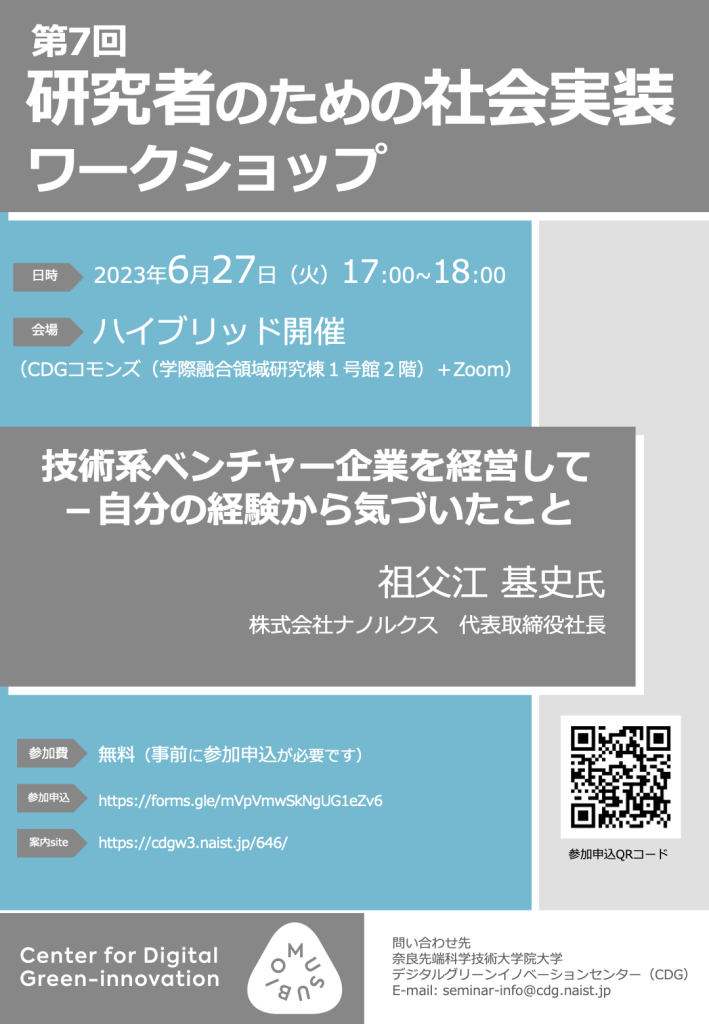In this WS, we asked Dr. Motoshi Sobue (CEO, Nanolux Co. Ltd.), who earned his PhD at NAIST, to give a lecture. Please join us for this valuable opportunity to hear his experiences and thoughts on why he decided to earn his PhD while managing a venture company, and what role PhD holders will play in society in the future.
The 7th Social Implementation Workshop for Researchers
Date and time:
Tuesday, June 27, 2023, 17:00-18:00
Venue/method:
Hybrid (onsite + online)
On-site: CDG Commons (Interdisciplinary Research Complex No. 1, 2nd floor)
Online: Zoom
Application for registration:
Please click here to register.
Lecturer: Dr. Motoshi Sobue (CEO, Nanolux Co. Ltd.)
Title: Managing a Technology Venture Company – What I realized from my experience
Abstract:
In Japan, it is said that the number of companies that develop from venture businesses is as small as one thousand three. Although it is indisputable that the future of venture businesses is important for Japan, many people tend to think that it is not a good idea to do it on their own. After working for some companies for about 25 years, I became CEO of Nanolux Co. Ltd., a venture company working on the commercialization of color night vision technology, which enables color images to be produced even in total darkness. Here are some real-life examples of ventures where we felt that “there were fewer obstacles than we had expected when we tried.”
Color night vision technology was developed at the National Institute of Advanced Industrial Science and Technology (AIST) and transferred to Nanolux. Applications include surveillance and in-vehicle cameras, and other fields where high growth is expected. Two years ago, when we started this company, we had only two engineers and no funds. Later, we were able to obtain a grant from the Ministry of Economy, Trade and Industry (METI) and have been active for about eight years, reaching the stage of full-scale manufacturing and sales.
Many people have the impression that venture businesses are (1) “too risky,” (2) “I feel insecure because no one will protect me if I leave the organization,” and (3) “I have no business ideas. However, with regard to (1) “high risk,” Japanese society is favorable to venture businesses, and there are several public subsidies available, including from the Ministry of Economy, Trade and Industry, and the adoption rate is realistic at several tens of percent. Although cash is also necessary since the full amount is not provided, the necessary funds could be obtained through bank loans without a guarantee from the president of the company. Venture capitalists are also actively providing funding for start-up companies. Today, working for a company cannot be said to be low-risk, but compared to working for a company, which is “middle-risk, low-return,” I feel that a venture business is “middle-risk, high-return. In the case of (2), “they don’t protect us,” we had to explain and get approval from our superiors in the company when we were working for a company. As for (3) “lack of business ideas,” in Japan, which has a far greater accumulation of technology than emerging Asian countries, what is lacking is managers, and those who have had successes and failures in serious competition in the corporate world can do well even if the environment changes. People tend to think that venture businesses are suited for young people, but even in the U.S., the average age of entrepreneurs is over 40.
Looking back on my less than two years of venture experience, one thing that has been useful is English. I was able to get my first funding (May 2017) from a major Taiwanese IT company for an immediate 100 million yen investment because I had the English language skills to convey my intentions and ambitions. The other reason was that I had prior exposure to the venture world, and it helped that I had been supporting venture companies since I was working for a large corporation. To unleash an individual’s abilities, it may be necessary to devote oneself to academic research, but I believe that there is an aspect of engineering that is useful to people only when it is used. I believe that the expansion of venture paths that unleash individual abilities will open up opportunities for multifaceted activities.
Organized by: Center for Digital Green-innovation (CDG)
Inquiry: here


